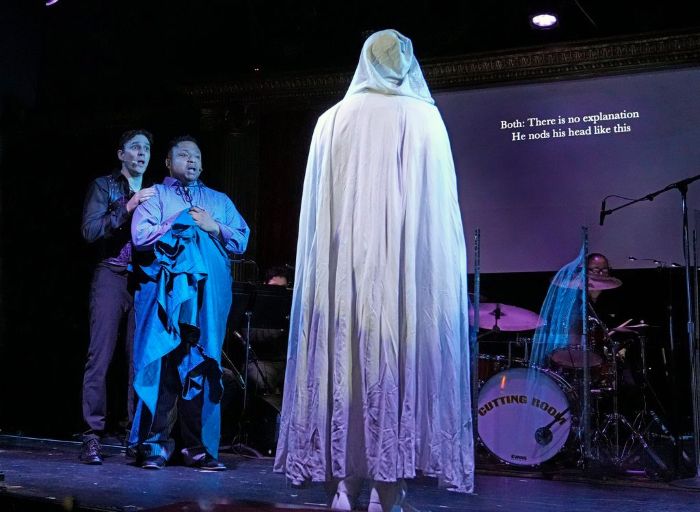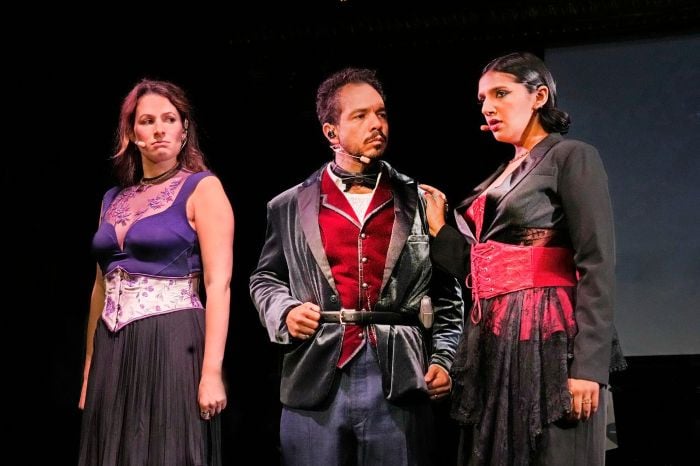Long regarded as one of the greatest operas of all time, Don Giovanni, with music by Austrian prodigy Wolfgang Amadeus Mozart and an Italian libretto by Lorenzo Da Ponte, made its debut at the National Theatre of Bohemia in Prague on October 29, 1787. Based on the original version of the centuries old Spanish legend of the notoriously libertine womanizing nobleman Don Juan, recounted by Tirso de Molina in his 1630 play El Burlador de Sevilla (The Trickster of Seville), the two-act opera is the subject of a newly reimagined production, Mozart’s Don Giovanni – A Rock Opera, translated, orchestrated, and directed by Adam B. Levowitz for a current audience, with a mix of then and now.

Set in Spain, “some time ago,” the revised variant, playing a limited engagement at The Cutting Room, still combines the styles of opera buffa (comic opera) and drama giocoso (playful drama) with elements of the supernatural, in its exploration of the themes of promiscuity, deception, and seduction, morality, repentance, and retribution. But the narrative has been condensed from three-and-a-half hours to two, including an intermission between acts, the characters have been reduced to six main roles, the lyrics have been rewritten in English, with some updated language and bits of contemporary references in the music (no spoilers here; half the fun is recognizing them for yourself), and the instrumentation has been switched from a classical orchestra to an electrifying on-stage ten-piece rock band (Music Director/Conductor Nevada Lozano on piano, Mike Rosengarten on lead guitar, Micah Burgess on rhythm guitar, Yuka Tadano on bass, Rosa Avila on drums, John Chudoba and Max Levowitz on trumpet, Julie Zedeck and Naomi Cuellar on trombone, and Brandon Moodie on bass trombone).
There is also a metatheatrical framing device employed here – a prologue with a message from the Baroness who invited us to a party in her cutting room (a play on the name of the venue, where she crafts naughty lingerie) to celebrate the 100th anniversary of the death of Mozart (in 1891) by enjoying a presentation of Don Giovanni, each table receiving a letter informing us that she’s unable to attend, and her valet Luitpold (whom she insists on calling Ludwig) taking charge of the introduction in direct address to the audience, setting the opera buffa tone, transitioning first into the stage manager, and then the character of Don Giovanni’s loyal servant Leporello – and the opera begins.

The story follows the main plot points of the original, centered on the incessant sexual conquests of the titular character (recorded by Leporello and sung in “The Almanac of Fornication,” a raunchier current take on Mozart’s “Madamina, il catalogo è questo”), his illicit liaison with Donna Anna – daughter of the Commendatore, engaged to Don Ottavio – which is discovered by her father, who challenges Don Giovanni to a duel (fight direction by Jared Kirby, New York Combat for Stage and Screen), is killed by his sword, and whose death Anna expects her fiancé to avenge by murdering him. But Don Giovanni continues to escape through trickery, lies, and disguises, and to entice others with his good looks and sex appeal, beguiling flattery and false sincerity, most notably Donna Elvira – another noblewoman he had previously bedded and abandoned – with the unwilling aid of Leporello, who was indebted to him for saving his life and couldn’t leave, as much as he would like to.
Though Anna, Ottavio, and Elvira are all impacted by his debauchery, they disagree about whether Don Giovanni should be punished or forgiven. Confrontations ensue, and the beguiling lecher, still living by the motto, “Let us have women, wine, and laughter/No regrets the morning after,” keeps slipping away from their attempts at vengeance and reconciliation, until he and Leporello seek refuge from his pursuers in a cemetery by a memorial statue of the Commendatore, where his past literally haunts him, the ghost of the man he killed speaks to him, and demons drag him into hell as punishment for his sins and refusal to repent, thereby hitting all of Mozart’s signature notes of comedic, dramatic, and otherworldly in his iconic opera.

An impressive cast of six brings the thoughts and emotions, humor and drama, revised language and attitudes, and masterful operatic voices to the roles, led by Ryan Silverman as the swaggering, alluring, and evasive Don Giovanni and Richard Coleman as Leporello, providing much of the production’s comical situations, exasperated reactions, and skittish behavior. Rachel Zatcoff as Donna Elvira, Anchal Dhir as Donna Anna, and Felipe Bombonato as Don Ottavio provide the perfect foils, embracing the thought-provoking moral issues, personal anger, indignation, and accountability, considerations of how best to deal with the perpetrator, to come to terms with each other, and to exact retribution for the death of the Commendatore, played with a commanding sense of honor and an ominous spectral presence by Edwin Jhamaal Davis.
They do it all while actively moving around the shallow downstage space in front of the band, with no scenic design, minimal props (by Samantha Doneff), including the Almanac and swords, and evocative shifts in lighting (by Oliver Salchert), in costumes (by Debbi Hobson) that are referenced in the Baroness’s prologue and, like Levowitz’s libretto, designed with the intent of speaking to a 2025 audience by combining the past with the present. Oddly, though the opera has been rewritten and is performed in English, English superscriptions, which often don’t match precisely what the cast is singing, appear on the projection screens behind the band and at the sides of the stage. While indicative of our digital age, I found it to be more of a distraction from the performers than an aid in understanding them.
Whether you’re a fan of the opera or a newcomer to Mozart’s Don Giovanni (a production of which will return to The Metropolitan Opera in September), this rock adaptation at The Cutting Room offers an intimate, entertaining, and easily comprehensible version of the time-honored masterwork.
Running Time: Approximately two hours, including an intermission.

Mozart’s Don Giovanni – A Rock Opera plays through Thursday, July 10, 2025, at The Cutting Room, 44 E 32nd Street, NYC. For tickets (priced at $44-$133, including fees, plus a $25 food and beverage minimum per person), go online, or find discount tickets at TodayTix.



